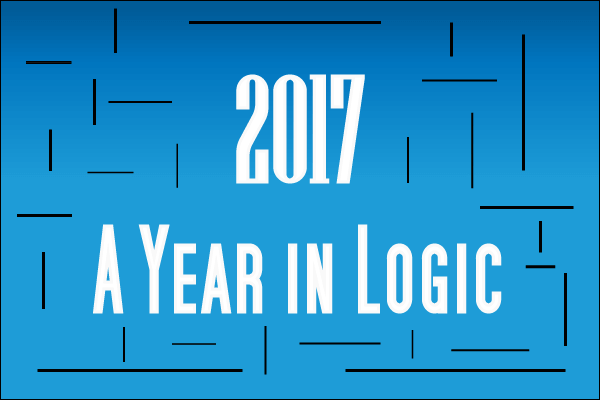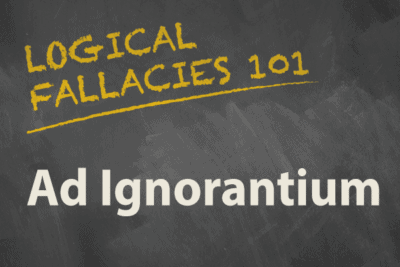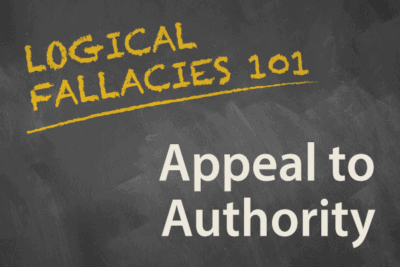In 2017 Southern Evangelical Seminary, will be using its blog to equip those on social media with training on the logical fallacies. It is no secret that Logic is no longer a required part of our education system. Regardless of affiliation, it seems that a large portion of our academic institutions do not encourage their students to take logic courses (i.e., make it a general education requirement). In my conversations with college graduates, it is very rare that I find someone who has been exposed to the subject of logic. I myself did not become exposed to the art of formal thinking until starting my education at Southern Evangelical Seminary! Students I have spoken with say that their ethics and critical thinking are “worked into” the curriculum, rather than taking a full class on the subject. This change in our educational philosophy appears to have affected our ability to consume and communicate information effectively. Thus, Dr. Peter Kreeft in his book Socratic Logic writes,
“On the basis of over 40 years of full time college teaching of almost 20, 000 students at 20 different schools, I am convinced that one of the reasons for the steep decline in student’s reading ability is the decline in the teaching of traditional logic” —Peter Kreeft, Socratic Logic, 2.
In addition, this lack is the basis for some publisher’s marketing strategy. Take a look at this promotional material from the Catholic Publisher, Loreto Publications:
“Many Catholics living today can remember when priests were well trained in theology and could express the Faith properly in their sermons and in their writing. That is because they were given sound teaching at seminary in Logic, Philosophy, and Dogmatic Theology. . .” — Loreto Publications 2017 Catalog, 21.
In a time when we are consuming more information than ever in history, it seems odd that a discipline that ensures one’s ability to think independently would be absent from most educational programs; Logic sophisticates your intellectual palate, requiring you to discard that which is illogical and identify that which is reasonable. It is this intellectual fitness that will enhance the quality of life for yourself and those around you. Here are four ways that Logic will increase your quality of life and why you should subscribe to our newsletter for the weekly logical fallacy articles in 2017.
(1) Make You More Productive and Effective on Social Media.
Everyone complains that social media is an echo chamber; no one listens to anything but his own side. In addition, we have all fallen prey to the always present “Click Bait.” This is where Logic can equip you to identify posts that are worth engaging or not engaging. You might be saying, “I don’ t use Facebook for political, ethical, religious, or anything controversial.” I know you don’t, and I have a lot of friends who consistently tell me this. Yet, I regularly receive messages or comments privately informing me that they are following a controversial post that I made on Facebook regarding politics, ethics, religion etc. In fact, Pew research shows that a majority of U.S. adults get their news from Social Media. The bottom line is that whether you are actively engaging ideas on Facebook or merely watching your friends latest vacation posts, intermingled in your newsfeed are posts that influence the way you think politically, religiously, and ethically. Logic prevents you from mindlessly accepting or rejecting information, and it enables you to focus your efforts on legitimate and substantive conversations surrounding your newsfeed. This will make your time spent on Social Media more beneficial for you and your friends that follow you. In addition to thinking better about what you consume, Logic will also aid you in writing clearly. Peter Kreeft says,
“Muddled writing fosters muddled thinking, and muddled thinking fosters muddled writing. Clear writing fosters clear thinking, and clear thinking fosters clear writing. Common sense expects this, and scientific studies confirm it. Writing skills have declined dramatically in the 40 years or so since symbolic logic has replaced Aristotelian logic, and I am convinced this is no coincidence” — Peter Kreeft, Socratic Logic, 2-3.
Given our era of texting and commenting, writing clearly is becoming more important as body-language and tone of voice are no longer a part of the conversation. Thus, in learning logic you will be more likely to communicate and focus on the content that is worth your time.
(2) Help You with Information Overload
There is no doubt that we are living in a culture overloaded with information. One of the challenges of dealing with large information is finding the information that is worth your time, mainly true information. Secondly, once you find an article you believe is worth your time, how do determine if you should trust its arguments? J. Mortimer Adler produced a foreboding description of our current dilemma when information overload was just beginning to take an effect. This quote is from the 1950s:
“There is a sense in which we moderns are inundated with facts to the detriment of understanding. One of the reasons for this situation is that the very media we have mentioned are so designed as to make thinking seem unnecessary. . . . The packaging of intellectual positions and views is one of the most active enterprises of some of the best minds of our day. The viewer of television, the listener to radio, the reader of magazines, is presented with a whole complex of elements—all the way from ingenious rhetoric to carefully selected data and statistics—to make it easy for him to “make up his own mind” with the minimum of difficulty and effort. But the packaging is often done so effectively that the viewer, listener, or reader does not make up his own mind at all. Instead, he inserts a packaged opinion into his mind, somewhat like inserting a cassette into a cassette player. He then pushes a button and “plays back” the opinion whenever it seems appropriate to do so. He has performed acceptably without having had to think” — J. Mortimer Adler, How to Read a Book, 4
The issue that faced us in the 1950s is intensified now with the rise of social technologies and our “social bubbles.” Logic will help you evaluate titles and their validity. As we will see later, logic will not necessarily tell you what is true, but it can tell you what is false; knowing what is false is half the battle.
(3) Give You the Freedom to Think for Yourself
As seen in the quote from Mortimer Adler above, if you want to merely regurgitate information, then you must be able to identify valid arguments and authorities. As Kreeft says,
“We need authority as well as logic. But we need logic to test our authorities” —Peter Kreeft, Socratic Logic, 6.
Given how much we are dependent on the information of others, we need to ensure that we keep those communicating the information accountable by exercising sound reason. With our current circumstances and lack of trust in our media, it is imperative that we exercise our intellectual abilities so that we may prevent our society from continuing down the foreboding path described by George Orwell in his book 1984:
“He picked up the children’s history book and looked at the portrait of Big Brother which formed its frontispiece…It was as though some huge force were pressing down upon you —something that penetrated inside your skull, battering against your brain, frightening you out of your beliefs, persuading you, almost, to deny the evidence of your senses. In the end the Party would announce that two and two made five, and you would have to believe it. It was inevitable that they should make that claim sooner or later: the logic of their position demanded it. Not merely the validity of experience, but the very existence of external reality was tacitly denied by their philosophy. The heresy of heresies was common sense” — George Orwell, 1984, chap. 7
(4) Helps You Find the Truth
Without truth, quality of life is impossible to attain. Since it is case that when we consistently act on false beliefs that we consistently reap negative consequences, it is imperative that we know the truth so that we may act in accordance with it. Kreeft says,
“Our last reason for studying logic is the simplest and most important of all. It is that logic helps us find truth, and truth is its own end: it is worth knowing for its own sake. Logic helps us to find truth, though it is not sufficient of itself to find truth. It helps us especially (1) by demanding that we define our terms so that we understand what we mean, and (2) by demanding that we give good reasons, arguments, [and] proofs” — Peter Kreeft, Socratic Logic, 7.
Thus, attaining truth as the natural goal of all rational beings brings about a higher quality of life.
Jesus said “I am the Way, the Truth, and the Life.” This is a claim, that we can either accept to our benefit or deny to our detriment. However, if someone were to assert a contrary claim that “Isalm is the only way to God,” then we have three claims, but only one can we affirm as true.
- Jesus is the only way to God.
- Islam is the only way to God.
- Both are false, and we need to search for another option.
Logic informs us that if one of these options is true, the others are necessarily false. Therefore, logic helps us know what is true, by telling us what is false; this is known as the process of elimination. If Christianity is true, then the claim that “Islam is the only way” is necessarily false and vice versa.
Humans are by nature judgmental creatures. They ingest information and judge it as true, false, or nonsense. Logic is not sufficient to tell us the truth. It is a guide to help us evaluate competing claims. Without logic, we only have our intuitions to guide our investigation, and without reason our intuitions are easily swayed towards emotional, irrational, and false beliefs. Logic should not be done in a vacuum; it is a handmaid to other forms of investigation (i.e., biology, physics, ethics, theology, philosophy, politics, history etc.). Logic is a guide to the truth, and it is in being directed towards truth where logic finds its greatest enhancement to one’s life. After all, truth is what all men are seeking.
I hope that these four reasons for studying logic have persuaded you to follow our blog and equip yourself to be able to evaluate arguments and opinions accurately. To receive our “Logical Fallacy of The Week” as well as a free e-book, subscribe to our newsletter and train yourself to
“Walk in wisdom toward outsiders, making the best use of the time” — Colossians 4:5, ESV.










